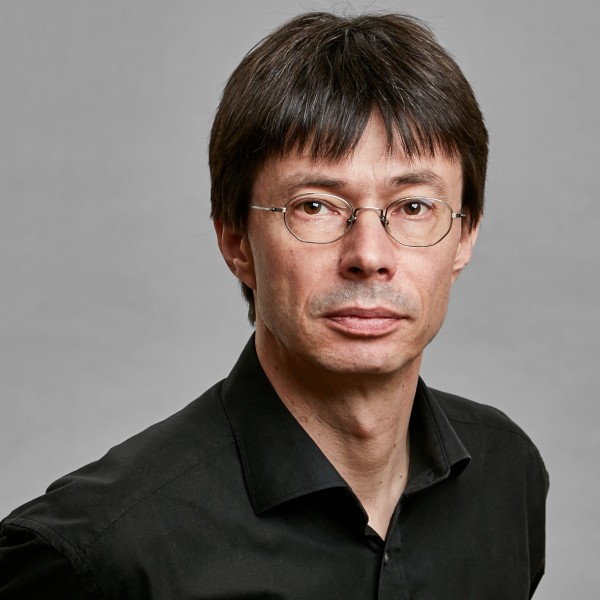
‘We must break the taboo that ‘forever chemicals’ are indispensable’

Synthetic substances known as PFAS are in everything from non-stick pans to clothing. But regulation of these widely used but potentially harmful, persistent substances is complex. Swiss professor Martin Scheringer, a leading expert in this field, talks to SWI swissinfo.ch about the challenges of dealing with so-called forever chemicals.
The scale and pollution of forever chemicals is increasingly making headlines, especially in the US and Europe. A study publishedExternal link this summer reported PFAS in nearly half of US tap water. Certain levels of PFAS may lead to health problems like cancer, thyroid disease or fertility issues, as well as environmental damage. New researchExternal link funded by the US government, published in September, found evidence that women diagnosed with some “hormonally driven” cancers had exposures to certain PFAS. The synthetic substances are a hot topic for regulators and lawmakers with potential bans on the table.
The name “forever chemicals”, or per- and polyfluoroalkyl substances (PFAS), comes from their ability to accumulate in water and soils, as they do not decompose due to an extremely strong bond between carbon and fluorine atoms. Most people ingest or inhale these synthetic chemicals released through contaminated water and food — even air, according to the External linkUS National Institute of Environmental Health SciencesExternal link.

There are thousands of different PFAS – they are used in all sorts of products and machines, including cars, textiles, medical gear, wind turbines and non-stick pans due to their long-term resistance to extreme temperatures and corrosion.
The chemicals are also used to keep food from sticking to packaging or cookware, make clothes and carpets resistant to stains, and create firefighting foam that is more effective, for example. But they could easily be left out of consumer products, as Martin Scheringer, a senior environmental scientist at the federal technology institute ETH Zurich and chair of the International Panel on Chemical Pollution (IPCP), explains.
SWI swissinfo.ch: How serious is the spread of PFAS?
Martin Scheringer: The problem is serious because it is widespread and practically everywhere. It’s also long lasting. It would be very difficult and expensive to handle, and we may not ever be able to solve it.
It’s very difficult to take back something that is diluted in the environment similar to CO2 from the atmosphere. That’s very expensive and technically challenging. And there are limits to what we can do technically when extracting PFAS from groundwater. That’s why I think they’re a real problem.
SWI: Earlier this year the “Forever Pollution Project” identified high levels of PFAS at thousands of sites across Europe, including in Switzerland. You say the results are serious: although PFAS do not cause acute health problems, they can accumulate in the body and cause chronic diseases.
M.S.: I’ve talked to PFAS experts in human toxicology, and they say it’s very important to point out that something that has chronic toxicity, a long-term toxicity, can be as bad as something that has high acute toxicity. If you drink water with PFAS, you don’t die, you don’t get a rash. But if you do this for a long time, you may develop cancer or other diseases.

More
Research identifies 134 ‘forever chemicals’ hotspots across Switzerland
SWI: The Swiss Federal Office of Public Health published a human biomonitoring study in August that found 3.6% of participants were exposed to concentrations of perfluorooctanesulfonic acid, or PFOS, a substance banned in Switzerland since 2010, that exceeded the national threshold value. What’s your view on this?
M.S.: PFOS is one of the most toxic PFAS as far as we know. We should certainly be concerned: 3.6% is quite a number of people and for the individuals it’s certainly not great. These people should be informed about the situation, and we should try to find out where these high levels of PFOS come from. How do these people live and is it something in their habits and the type of material that they have in their homes or in their food? Or is it something that comes from drinking water and contamination, from firefighting foam, for example.
How can we isolate these people from that sort of pollution? Then they need to get rid of the PFOS in their body because it is eliminated slowly. In four years, the levels go down by 50%.External link

More
Undesirable chemicals found in bodies of Swiss residents
SWI: There is much discussion around regulation and bans of PFAS in the European Union and the United States. Can we expect changes soon?
M.S.: There was this proposal by five countries in the EU to restrict PFAS as a very broad group and the proposal is in consultation. But they could take a long time to reach a conclusion. Overall, this is a very important regulatory move because it addresses this entire group in a comprehensive way for the first time.
The Swiss government says it takes seriously the risks to health and the environment of PFAS and other persistent pollutants. This issue “has taken on a new dimension in recent years, with the multiplication of analyses which show the presence, sometimes in concentrations dangerous to health, of substances from the PFAS group everywhere in the environment”, it saidExternal link in reply to a 2022 parliamentary question. Cantons face difficulties in implementing current law in the areas of water protection, contaminated sites, waste management and the consumption of wild animals like fish, it added.
The government is preparing an action plan over the next two years to reduce the exposure of humans and the environment to persistent substances. The federal authorities are also closely following developments in the EU, notably the talks on a possible PFAS ban, and will adapt Swiss regulations accordingly.
Whatever comes out will be observed very closely around the world. China, for example, has an enormous PFAS contamination problem. And although they’ve been very independent, they’ll also be watching.
SWI: In the US and the Netherlands, the chemical giants 3M, Chemours and its predecessor Dupont have been hit by lawsuits and hefty financial settlementsExternal link for discharging potentially harmful PFAS into the local environment and public water supplies. What’s your view on these lawsuits?
M.S.: They are very significant. This is very important because these companies are involved in this whole thing, or caused it, and it’s important to address them. Switzerland doesn’t have the same type of industry; these companies don’t work here.
But these lawsuits are necessary. They are kind of pushing the firms out of that area of businessExternal link [PFAS] to some extent. These companies realise that this is the end to the practices that they have been using for many years and decades.

More
Swiss landfill site found to contain low-level radioactive material
SWI: There are PFAS-free alternatives. Which examples are making a difference?
M.S.: There are many areas where it’s possible to replace PFAS or just leave them out of the product, such as skin creams, ski wax, or water-resistant climbing rope. There are outdoor clothing, jackets, sleeping bags and tents without PFAS. Denmark has banned PFAS in food packaging. People have found alternatives and demonstrated that they work. There are hundreds of examples available.
I’ve heard several chemical companies say that these PFAS applications in consumer products can go. They don’t want to fight for them and say, ‘we no longer need them’.
But there are two areas where their production volume and revenues are much bigger: one is fluoropolymers such as Teflon and the other is refrigerants, fluorinated gases, used in heat pumps and refrigeration. These are the two areas where the industry will try to push back.
A key point is that we need to break this taboo that PFAS are indispensable – they are not, and certainly not in consumer applications. They may be very important in some industrial applications because they have unique and strong properties, but then they are totally dispensable in consumer products.
Edited by Sabrina Weiss

More
‘Forever chemicals’ detected at half of Swiss groundwater sites

In compliance with the JTI standards
More: SWI swissinfo.ch certified by the Journalism Trust Initiative
















![The four-metre-long painting "Sonntag der Bergbauern" [Sunday of the Mountain Farmers, 1923-24/26] had to be removed by a crane from the German Chancellery in Berlin for the exhibition in Bern.](https://www.swissinfo.ch/content/wp-content/uploads/sites/13/2025/12/01_Pressebild_KirchnerxKirchner.jpg?ver=cb688ed5)















You can find an overview of ongoing debates with our journalists here . Please join us!
If you want to start a conversation about a topic raised in this article or want to report factual errors, email us at english@swissinfo.ch.